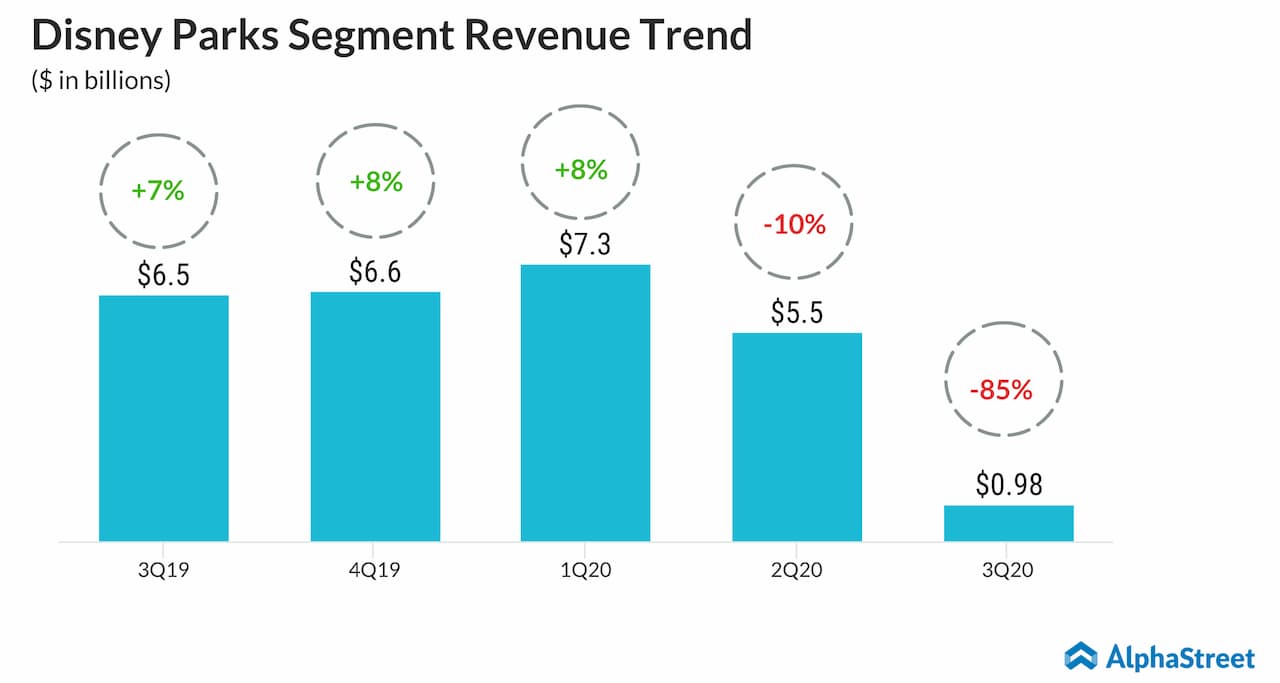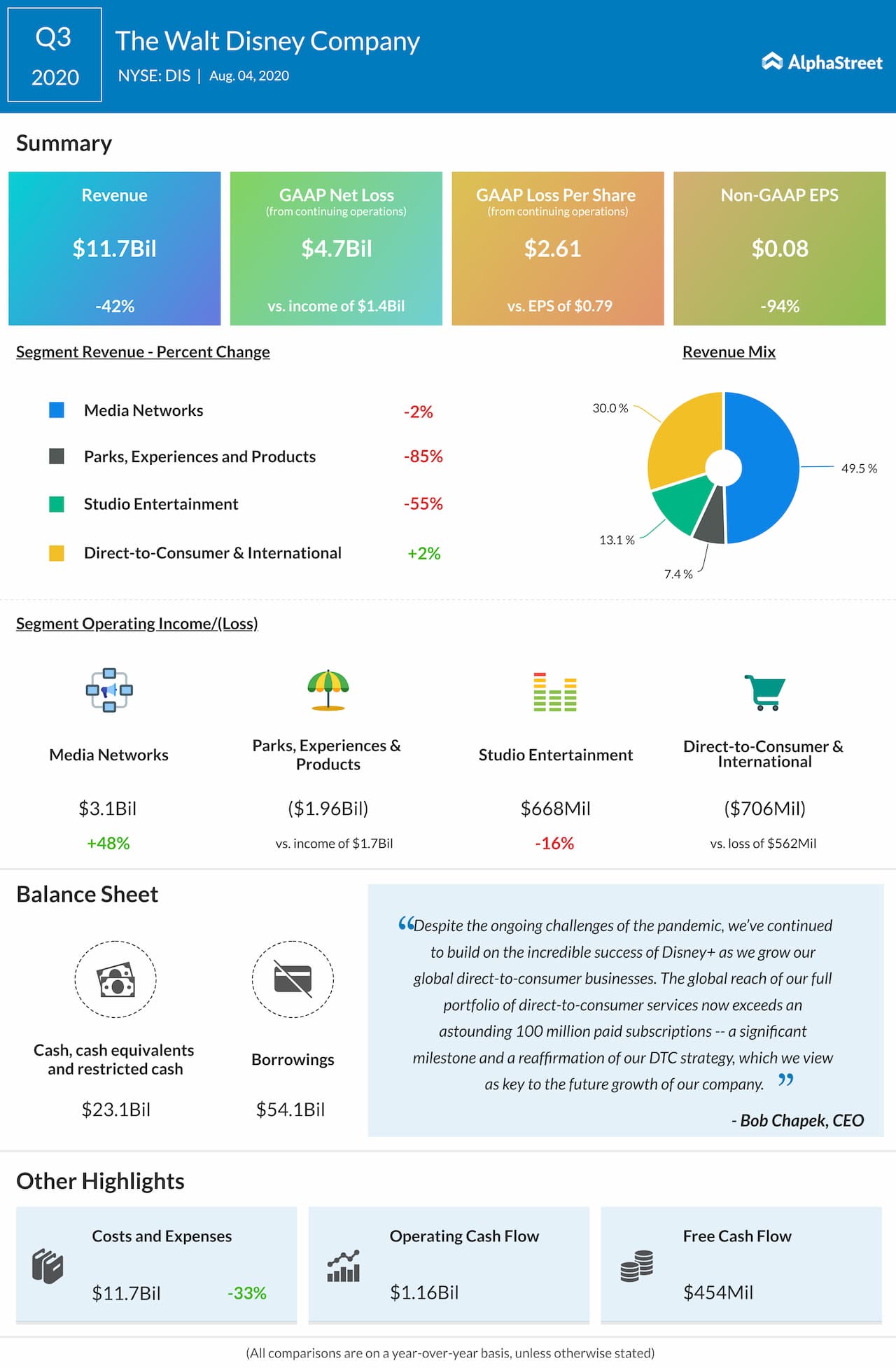The Walt Disney Company (NYSE: DIS) had a dismal Q3 2020, reporting a GAAP net loss, which is quite rare for the entertainment giant. The company saw revenue drop 42% and adjusted EPS fall 94% year-over-year as revenues declined across all its segments, barring Direct-to-consumer & International.
The biggest hit to the results came from the Studio Entertainment, and Parks, Experiences and Products segments as revenues declined massively due to the pandemic. The company’s streaming division is doing well with particular strength in Disney +. However, this momentum does not seem to be sufficient enough to offset the weakness seen in the Studio and Parks businesses.
Disney +
At quarter-end, Disney + had 57.5 million paid subscribers and this number increased to reach 60.5 million subscribers globally as of Monday, allowing the company to hit its initial targets well in advance. The company has also surpassed its internal subscriber projections in every major market that it has launched so far.
Disney plans to roll out Disney + in the Nordics, Belgium, Luxembourg, Portugal and Latin America this year. The company’s combined global reach across its full DTC portfolio, comprising Disney +, Hulu and ESPN +, now exceeds 100 million paid subscriptions.
Disney is ramping up its content on Disney + and plans to offer subscribers the film Mulan on a premier access basis in September. The company has The Mandalorian 2 coming in October as well as a slew of Marvel content, which it believes will help drive further growth.
In order to take advantage of the increasing adoption of streaming services by customers, Disney is planning to launch an international direct-to-consumer general entertainment offering under the Star brand in calendar year 2021.
The offering will comprise of the company’s own content from the libraries of ABC Studios, Fox Television, FX, Freeform, 20th Century Studios and Searchlight, and in many markets it will be integrated into the Disney + platform.
Disney chose to launch the new offering under the Star brand instead of Hulu because Hulu aggregates third-party content while the new offering will not do so. Hulu also does not have brand awareness outside the US and it does not have internationally-licensed content.
In short, Disney sees tremendous opportunity in the direct-to-consumer space and the company plans to take full advantage of this opportunity.
Studio and Parks
Disney’s Parks, Experiences and Products segment has consistently posted revenue increases in the past quarters until the health crisis erupted. However, this segment took the biggest hit in the third quarter falling 85% as the company’s theme parks, resorts and cruise line business remained closed for the entire quarter due to the COVID-19 pandemic.

Even though some sites have reopened, they have not seen the engagement levels that were visible prior to the outbreak as people remain hesitant to travel. The park at Hong Kong had to be shut again a month after reopening due to a government order. The disruptions at the theme parks have also impacted the Consumer Products business. The Parks segment has been the biggest revenue generator for Disney over the past three years. In FY 2019, Parks made up 37% of Disney’s total revenue. Comparatively, DTC made up 13% of total revenue. Parks also brings in a significant portion of revenue for Disney from merchandise sold at its locations.
Studio Entertainment saw a 55% drop in revenue due to lower theatrical distribution as theaters remained closed due to the pandemic. No significant titles were released in the quarter as opposed to the releases of Avengers: Endgame, Aladdin and Dark Phoenix in the same period a year ago.
Disney has produced some of the highest-grossing movies over the years, which have contributed a large chunk to revenues. Despite the DTC business gaining in strength over the past three years, the Studio business is still ahead of it in terms of revenue generated.
The halt in movie production and releases as well as the closures of theme parks and resorts continue to negatively impact Disney in a significant way. The momentum seen in the streaming business is not sufficient enough to offset the declines in these divisions that have posted strong results consistently. All said, Disney needs its theme parks back soon to get back on its feet.
Click here to read the full transcript of Disney Q3 2020 earnings call
